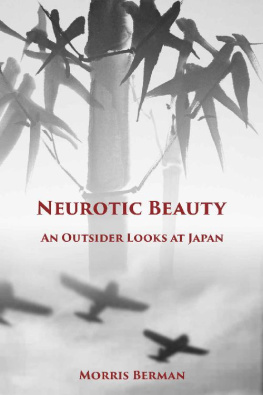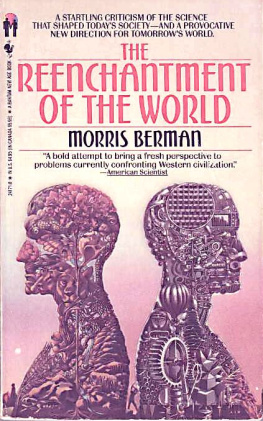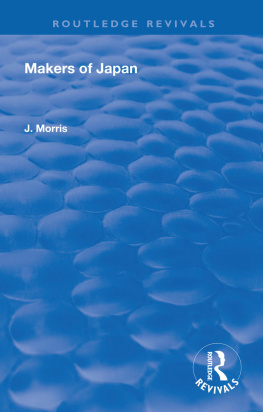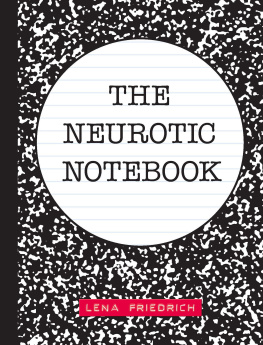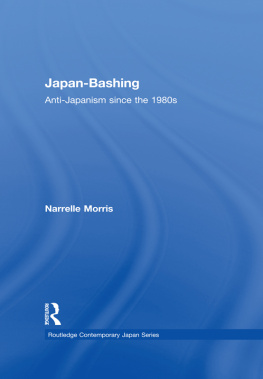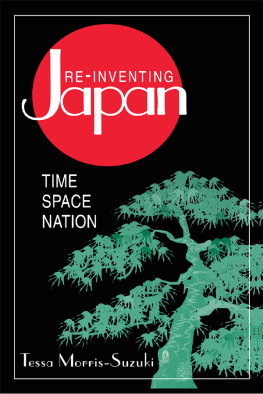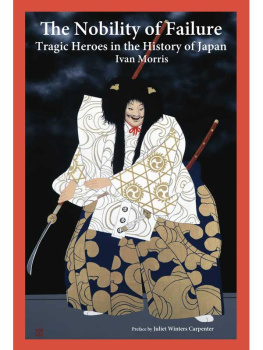Morris Berman - Neurotic Beauty: An Outsider Looks at Japan
Here you can read online Morris Berman - Neurotic Beauty: An Outsider Looks at Japan full text of the book (entire story) in english for free. Download pdf and epub, get meaning, cover and reviews about this ebook. year: 2017, publisher: Water Street Press, genre: Religion. Description of the work, (preface) as well as reviews are available. Best literature library LitArk.com created for fans of good reading and offers a wide selection of genres:
Romance novel
Science fiction
Adventure
Detective
Science
History
Home and family
Prose
Art
Politics
Computer
Non-fiction
Religion
Business
Children
Humor
Choose a favorite category and find really read worthwhile books. Enjoy immersion in the world of imagination, feel the emotions of the characters or learn something new for yourself, make an fascinating discovery.
- Book:Neurotic Beauty: An Outsider Looks at Japan
- Author:
- Publisher:Water Street Press
- Genre:
- Year:2017
- Rating:4 / 5
- Favourites:Add to favourites
- Your mark:
- 80
- 1
- 2
- 3
- 4
- 5
Neurotic Beauty: An Outsider Looks at Japan: summary, description and annotation
We offer to read an annotation, description, summary or preface (depends on what the author of the book "Neurotic Beauty: An Outsider Looks at Japan" wrote himself). If you haven't found the necessary information about the book — write in the comments, we will try to find it.
Neurotic Beauty: An Outsider Looks at Japan — read online for free the complete book (whole text) full work
Below is the text of the book, divided by pages. System saving the place of the last page read, allows you to conveniently read the book "Neurotic Beauty: An Outsider Looks at Japan" online for free, without having to search again every time where you left off. Put a bookmark, and you can go to the page where you finished reading at any time.
Font size:
Interval:
Bookmark:

Neurotic Beauty:
An Outsider Looks at Japan
Morris Berman

Praise for Neurotic Beauty
In Neurotic Beauty , Morris Berman points out a number of significant motifs in the long relationship between America and Japan (beginning in 1853) that go well beyond mere bilateralism. With his customary acumen, Professor Berman shows how that relationship has managed to acquire a world-historical momentum. However, it is not only in the historical arena that modernity is brought to bear on pre-modernity, but also in the cultural sphere, where American hyper-individualism serves to throw Japanese collectivism into sharp relief, and vice versa. Above all, the most important contribution of this book is the contrast the author makes at the civilizational level: the possibility that the capitalist myth of salvation through growth may finally be superseded by the hope of a post-capitalist world. If American civilization is the last outpost of the expansionist myth, then its fateful encounter with Japan, as described by Professor Berman, suggests to us a picture of its final transformation. A vivid and provocative study.
Yasunari Takada, Professor of Transcultural Studies, University of Tokyo
Morris Bermans Outsider, looking at Japan carefully and from several perspectives, has seen more deeply than many recent observers, and he recounts the results of his subsequent reflections with intelligence and panache. Hes especially good on Japanese crafts and fine arts and their relation to the Zen tradition, and offers keen insights into the many intersections between past and present, East Asia and the West, that he encounters in his travels and conversations. Much is to be learned from his judicious account of the fraught relations between Japan and the United States over the past century, and the last chapter, on Japan as a Post-Capitalist Model, should be required reading for any thoughtful person whos interested in where our deranged world might be heading in the decades to come.
Graham Parkes, University College Cork, Ireland
The history of Japan deserves our attention, since we had so much to do with it after the fateful morning in 1853 when Commodore Perrys black ships sailed into Tokyo Bay. Japan was thrust into modernity by us overnight, and suffered greatly as a result. They may be the first nation to opt out of it as the techno-industrial era winds down. Morris Berman does more than anyone to illuminate the arc of this story and the attendant mysteries of Japanese culture, with all its artistry, resilience, and periodic craziness.
James Howard Kunstler, author of The Long Emergency
Reading [Japans] DNA and patiently explaining to impatient Americans what it is that the Japanese know, is the aimand achievementof Neurotic Beauty .
George Scialabba
Also by Morris Berman
Social Change and Scientific Organization
Trilogy on human consciousness:
The Reenchantment of the World
Coming to Our Senses
Wandering God: A Study in Nomadic Spirituality
Trilogy on the American empire:
The Twilight of American Culture
Dark Ages America: The Final Phase of Empire
Why America Failed: The Roots of Imperial Decline
A Question of Values (essays)
Destiny (fiction)
Counting Blessings (poetry)
Spinning Straw Into Gold (memoir)
Table of Contents
List of Illustrations
Note to the Reader
For the Japanese names that require it, I have inserted macrons when that is part of the English spelling, except in the case of names that are very familiar, such as Tokyo or Aikido. Names of persons in Japanese put the family name first, but I have reversed that for a Western audience for the sake of greater familiarity. Hence Yukio Mishima, Kitar Nishida, and so on. In the case of transliterations from the Chinese, I used the Pinyin system (Nanjing rather than Nanking, etc.). Finally, in most cases, in the text itself, I changed the names of Japanese friends and people I interviewed, to preserve their anonymity.
Introduction: Thinking Otherwise
It is not a question of Eastern culture negating Western culture or vice-versa, nor of subsuming one into the other. It is a probing deeper than we have gone so far until both are bathed in a new light.
Kitar Nishida
My love of Japan goes back more than fifty years, to when I was sixteen years old. I dont recall the exact context, or why a high school English teacher would be talking to his class about Japanese sword making, but he did, and I never forgot it. The artisan, he explained, would fast and pray for three days before beginning the work. Then, in a very clear and focused state of mind, he would forge and temper the steel, repeatedly folding it over into a many-layered sandwich that was finally thin as a sheet. The result was a blade that was so hard, and so sharp, it could cut through a medium-size tree trunk as though it were butter.
I was transfixed by this; it spoke of an alien world, and yet one that I found oddly familiar. The truth was that for various reasons, I never fit into whiz-bang technological America, not even as a child. Intuitively, I regarded its notion of progress as a mistake, and from age seven or so felt like the proverbial stranger in a strange land. Craft, writes Glenn Adamson of the Victoria and Albert Museum, affords an opportunity to think otherwise. The experience of craft, he goes on to say, is always a revelation.1 So it was for me. I was not impressed by the ton of frozen foods and tail fins being cranked out by corporate America; not at all. But fasting and praying for three entire days so that you might produce a sword of exquisite beauty and perfectionthat, I definitely found impressive. It was evidence of a whole other way of life, one rooted in care and attention. Even at an early age, I understood that there had to be a relationship between the quality of the blade, and the quality of the mind that brought it into being. I knew, on some level, that in a general sense this was what I wanted to be doing with my life.
These sensibilities, as already indicated, antedated the epiphany of my English class. As a pre-teen, I watched the destruction of my hometown with bewilderment and dismay. First there was the ripping out of the trolley tracks to make way for the ugly Interstate Highway System. Shortly after came the paving over of our red-brick street so that cars could tear through it without having to slow down. Step by step, anything that had craft or character attached to it got dismantled and replaced, until the town became just one more boring, homogeneous American city. Everything was rush, rush, to no human purpose. They made a wasteland and called it progress, to paraphrase Tacitus.
Japan, in any case, stayed in my mind. I was hardly the first American to find, in a romanticized version of the country, a quality of life that was lacking in my own. Years laterin my twenties nowthere was a popular magazine advertisement (for aftershave? I cant quite remember) that showed an elegantly dressed gentleman sitting at a table surrounded by classic Japanese wood-and-paper screens shji ), on which a Go set had been placed. (Go is a Japanese board game in which players alternately put black and white stones down on a grid.) The caption said something like, He is at home in worlds most people dont even know exist. And I remember, as a young adult, identifying with that man, wanting to be like him, and enter those beautiful other-worldly worlds. A few years later, I did take up the game of Goand found it so complex (despite its apparent simplicity) that I realized I would have to decide between being a writer and becoming a professional Go player; that it was impossible to do both.
Font size:
Interval:
Bookmark:
Similar books «Neurotic Beauty: An Outsider Looks at Japan»
Look at similar books to Neurotic Beauty: An Outsider Looks at Japan. We have selected literature similar in name and meaning in the hope of providing readers with more options to find new, interesting, not yet read works.
Discussion, reviews of the book Neurotic Beauty: An Outsider Looks at Japan and just readers' own opinions. Leave your comments, write what you think about the work, its meaning or the main characters. Specify what exactly you liked and what you didn't like, and why you think so.

